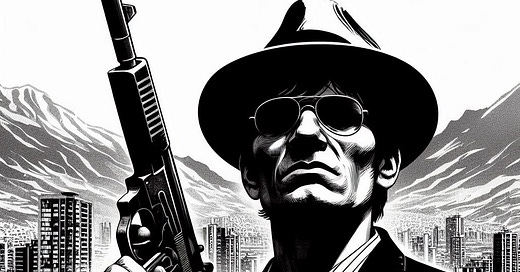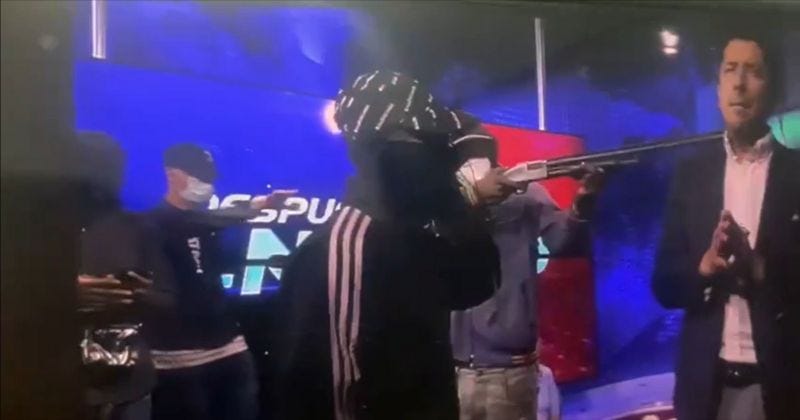Guayaquil, epicenter of criminal chaos. How did this port city become the "murder capital" of Ecuador?
Organized crime, state corruption, and the cocaine trade cause a wave of violence in the once-peaceful Andean nation
An ongoing wave of crime in Ecuador took a turn towards chaos on Tuesday as dozens of acts of gang violence left at least 8 dead, including 2 policemen, and an unconfirmed number of people kidnapped— including at least 7 police officers.
Viewers of television station TC watched live as gunmen took over the studio, threatening employees and journalists with shotguns, automatic submachine guns, and machetes.
The men, wearing facemasks and dressed mostly in black, forced the staff to lie down and sit on the floor, while gunshots and shouts could be heard off-camera in the live feed, which was eventually cut off.
Police eventually stormed the television station, arresting 13 of the gunmen. Other suspects were reported to have escaped.
The incident was the most visible act in a rash of violence following the announcement of President Daniel Noboa of a state of emergency on Monday, which includes the deployment of soldiers to combat growing gang violence, but it was far from the most sinister.
Early morning Tuesday a parked vehicle exploded in front of a military base in the city of Guayaquil. The event foreshadowed a series of explosions throughout the country, in Esmeraldas and Los Rios provinces, and Cuenca, and by late afternoon Ecuador’s Prosecutor's Office said it was investigating reports of two more in Guayaquil.
Multiple hospitals around the country and a University in Guayaquil were also attacked by armed men in what seemed to be a coordinated attempt to kidnap both citizens and police.
Three police officers were abducted from their police station in the southern city of Machala, police said on social media on Tuesday, while a fourth missing officer was abducted by three unknown assailants in Quito. Three other agents were kidnapped in Los Rios province after a patrol car was hit by an explosive.
The incidents follow a series of violent prison riots, and the daring jailbreak of Adolfo Macias, alias "Fito", one of the leaders of the gang Los Choneros, from a prison in Guayaquil
Guayaquil, Ecuador's largest city on the coast, has become the epicenter of spiraling crime in the country, and its ports have become a hub for international drug smuggling. Los Choneros are one of many gangs that have been implicated in working with both Mexican cartels and Colombian narcos.
In response to the attacks, Noboa, who took office in November, declared the country to be in a state of “internal armed conflict”, and ordered security forces to “neutralize” the groups.
Quito and Guayaquil were placed under indefinite curfew and the military was deployed to the streets.
Naboa won elections on promises to combat rising crime rates tied to increases in drug trafficking as gangs fight one another, as well as the government, to control lucrative smuggling routes.
Endemic corruption among security forces in the country has exacerbated the problem, with the government seemingly unable to control the growing power of gangs.
Homicides in the country doubled in 2023 compared to the previous year.
The growing power of organized crime even disrupted Ecuadorian presidential elections when candidate Fernando Villavicencio was assassinated by armed assailants in August. The suspects in the murder were all killed in jail on the same day amidst prison riots in multiple facilities, but “Fito” has been implicated in planning the killing.
“Ecuador did not reach this point overnight,” said journalist Nelly Luna Amancio. “It is the result of years of impunity, the strengthening of relations between local mafias, global criminal organizations, and state corruption.”
Prisons in Ecuador have experienced increasing violence in recent years and have fallen under the control of organized crime in the country, who use them as recruiting grounds.
Over 400 prisoners have been killed in riots in the country since 2021, according to state reports.
The country-wide violence is presumed to be a show of power by organized crime groups as Naboa grows increasingly aggressive against gangs.
As part of criminal power struggles throughout the nation, the port city of Guayaquil has become the “murder capital of Ecuador” due to its strategic shipping location.
“Ecuador did not reach this point overnight,” said journalist Nelly Luna Amancio. “It is the result of years of impunity, the strengthening of relations between local mafias, global criminal organizations, and state corruption.”
Why is drug violence on the rise in Ecuador? “Ecuador is located between the two largest cocaine producers in the world: Colombia and Peru,” Fernando Carrión, a professor who studies security issues, told PWS. “In the last two years, Peru doubled its cocaine production and Colombia’s rose by 25%.”
Ecuador has become an indispensable route for narco-traffickers who want to move their cocaine north to Central and North America, and with the arrival of the drug trade, violence quickly followed.
This dynamic, along with low state institutionality and the lack of a coherent anti-narcotics policy, “allow these criminal groups to infiltrate and evade state institutions” to an alarming degree, said Carrión, “at political, judicial and economic levels.”
For these activities, the Mexican cartels used to pay for their services in dollars. However, Carrión warns that, in the last three years, this mechanism has changed: “They began to pay in drugs and this means that these local groups have to organize and monetize that in the local market. And the result is a strengthening and entrenchment [in local markets] of these criminal structures”
This fact, added to the fact that Guayaquil is the port “through which 65% of smuggled drugs leave the country”, means control over the port city is crucial for narco groups competing to control the smuggling market. It also means Guayaquil has become one of the most violent places in Ecuador as well as the largest domestic market for cocaine.
President Noboa on Monday in public comments on his state of emergency said "We will not negotiate with terrorists".
"These narco-terrorist groups intend to intimidate us and believe that we will give in to their demands. I have given clear and precise dispositions to military and police commanders to intervene in the control of prisons," he said.
The governments of Colombia and Peru offered their support and cooperation on Tuesday in battling the growing power of organized crime.
Naboa will need it. He faces not only entrenched criminal interests but complicity and deep infiltration by criminal groups among his security forces.
In the long run, things in Ecuador are likely to get worse before they get better.








As this continues to grow, will the instability go north? Will the cartels in Mexico merge as a consolidated force? If so this could add weight to the concerns that Cjng and others have major backers in China with plans to control Central America.